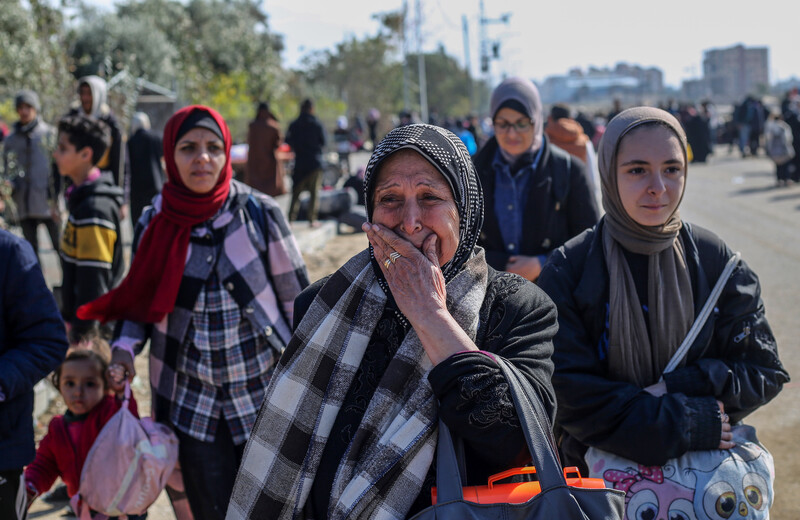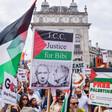Rights and Accountability 26 January 2024

Palestinians flee Khan Younis for areas further south in the Gaza Strip on 26 January.
DPAHistory was made at The Hague when the International Court of Justice on Friday – with a panel of judges from around the world – called for the prevention of genocidal acts in Gaza.
Raji Sourani, the director of the Gaza-based Palestinian Center for Human Rights, said that the ruling “is the first time we see Israel held accountable for its crimes before an international court.”
Responding to allegations of genocide made by South Africa, the UN’s top court issued several provisional measures – similar to an injunction or restraining order – while it considers the full case.
It may take the court years to reach a final ruling on South Africa’s genocide complaint against Israel.
The interim ruling was read out by Joan Donoghue, the president of the ICJ, an American lawyer who served in the State Department under US President Barack Obama.
Some had feared that Donoghue would align herself with the current US State Department under Joe Biden, who was Obama’s vice president.Antony Blinken, the current secretary of state, had dismissed South Africa’s complaint as “meritless” and White House national security spokesperson John Kirby called it “counterproductive and completely without any basis in fact whatsoever.”
That Donoghue and other judges acted independently of the positions of their governments was seen as a boost for the tattered reputation of international law.
Provisional measures
The provisional measures issued by the court call on Israel to “take all measures within its power” to prevent violations of articles of the Genocide Convention, to which it is a state party.
These acts include “killing members of the group; causing serious bodily or mental harm to members of the group; deliberately inflicting on the group conditions of life calculated to bring about its physical destruction in whole or in part; and imposing measures intended to prevent births within the group.”
While the court did not specifically call for a ceasefire, its second provisional measure states that Israel must “ensure with immediate effect that its military does not commit” any of those acts.
The lack of an explicit ceasefire call was a bitter disappointment for Palestinians in Gaza who are desperate for an end to the irreparable harm caused by Israel in its counteroffensive following Hamas’ 7 October military operation.
The 2.3 million Palestinians who live in Gaza have endured nearly four months of relentless bombing that has killed more than 26,000 people and repeatedly forced their displacement. Israel has razed entire districts while using food and water and other basic life necessities as weapons of war.South Africa had asked the court to order Israel to “immediately suspend its military operations in and against Gaza.”
Naledi Pandor, South Africa’s foreign minister, said that while she had hoped for an explicit ceasefire call, the court had effectively ordered one.
“In exercising the order, there would have to be a ceasefire,” Pandor said. “Without it, the order doesn’t actually work.”Human rights groups and legal experts likewise said on Friday that the only way for Israel to comply with the ruling – which is legally binding, though the court lacks enforcement powers – would be to observe an immediate ceasefire.
Shawan Jabarin, the director of the Palestinian human rights group Al-Haq, said that the ruling “is a de facto ceasefire, ordering Israel to end acts of genocide, including killing, with immediate effect.”
In its third provisional measure, the court calls on Israel to “prevent and punish the direct and public incitement to commit genocide in relation to” Palestinians in Gaza.Fourthly, the judges demand that Israel “take immediate and effective measures to enable the provision of urgently needed basic services and humanitarian assistance.”
The fifth provisional measure calls on Israel to “take effective measures to prevent the destruction and ensure the preservation of evidence” related to alleged violations of the Genocide Convention.
The court lastly called on Israel to submit a report to the tribunal on its compliance with the provisional measures within one month.
The judges voted overwhelmingly in favor of all of the provisional measures, with the exception of Julia Sebutinde from Uganda, currently serving her second term on the court, who opposed each.
South Africa and Israel each have ad hoc judges deliberating in the case. Judge Aharon Barak, who was appointed by the government of Israel, voted against four of the six measures.
Barak voted in favor of the measures pertaining to incitement and the provision of basic services and aid.
The court’s ruling also emphasizes “that all parties to the conflict in the Gaza Strip are bound by international humanitarian law” and calls for the “immediate and unconditional release” of captives being held in Gaza since 7 October.
On Thursday, Hamas said that it was following the ICJ deliberations “with great interest” and said that it would adhere to a ceasefire if the court issued a call for one, so long as it was reciprocated by Israel.
Hamas added that it would release its captives if Israel freed Palestinian prisoners. It also called for an end to Israel’s blockade on Gaza since 2007 and the entry of humanitarian aid.
“Clear duty”
Al Mezan, a Palestinian human rights group based in Gaza, called on Karim Khan, the chief prosecutor of the International Criminal Court, to “heed this decision and expedite investigations into high-level Israeli leaders involved in or inciting genocide.”
The ICC, which is also based in The Hague, is separate from the ICJ, and has been accused of bias for dragging its feet on the Palestine investigation opened in 2021 by Khan’s predecessor.
Agnès Callamard, the head of Amnesty International, said on Friday that “unified pressure” must be brought to bear on Israel, given its “flagrant disregard for international law.”
Noting that the court views “the survival of Palestinians in Gaza is at risk,” Callamard added that all states, including those who did not support South Africa’s case, “have a clear duty to ensure these measures are implemented.”
Benjamin Netanyahu, Israel’s prime minister, lashed out after the ICJ’s ruling, rejecting the charge of genocide as “outrageous” and accused the World Court of denying Israel’s “basic right to defend itself.”
Riyad al-Maliki, the Palestinian Authority foreign minister, said that the “the ICJ order is an important reminder that no state is above the law.”
He added that “it should serve as a wake-up call for Israel and actors who enabled its entrenched impunity.”
Issam Younis, the director of the Palestinian human rights group Al Mezan, which is based in Gaza, said that the interim decision “marks a pivotal step towards curbing the perpetual impunity granted to Israel by its allies.”Younis added that “the responsibility to end the ongoing genocide in Gaza now lies with the international community.”
Under the Genocide Convention, states have a duty to prevent acts of genocide.
Instead of preventing the commission of genocide, the US, which is a state party to the convention, has provided arms for Israel’s military campaign in Gaza. It has also given diplomatic support by repeatedly preventing a call for a ceasefire at the UN Security Council.
A hearing was held in a federal court in California on Friday as part of a lawsuit against President Joe Biden and his secretaries of state and defense.Palestinians are suing the three over their failure to prevent what the plaintiffs say is a genocide unfolding in Gaza, and for their complicity in the genocide.






Comments
ICJ Ruling
Permalink DefineJustice replied on
So, it is/was genocide, but no ceasefire ordered (read: continue bombing and killing). Got it.
ICJ
Permalink Peter Purich replied on
The ICJ is battered but standing firm! I hope the ICC is getting real pressure. If the West scoffs the ICJ (and ICC), the West is fascist (all right, is fascist).
US and vassals are arming & protecting their latest proxy: "Israel". There was Saddam, Ukraine, Taiwan, and now "Israel". There is a pattern.